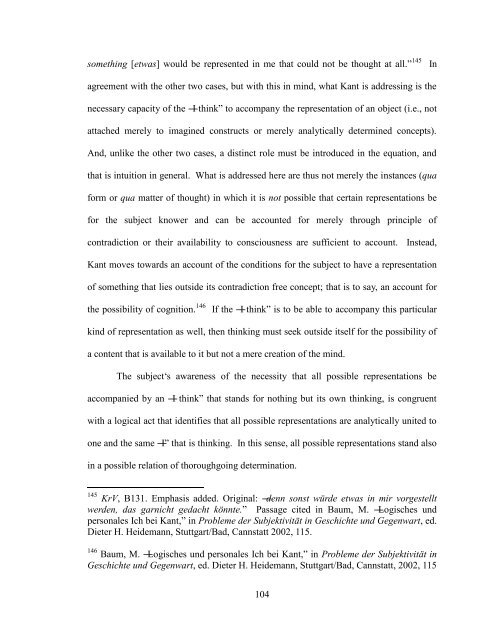The Doctrine of Self-positing and Receptivity in Kant's Late ...
The Doctrine of Self-positing and Receptivity in Kant's Late ...
The Doctrine of Self-positing and Receptivity in Kant's Late ...
Create successful ePaper yourself
Turn your PDF publications into a flip-book with our unique Google optimized e-Paper software.
someth<strong>in</strong>g [etwas] would be represented <strong>in</strong> me that could not be thought at all.‖ 145 In<br />
agreement with the other two cases, but with this <strong>in</strong> m<strong>in</strong>d, what Kant is address<strong>in</strong>g is the<br />
necessary capacity <strong>of</strong> the ―I th<strong>in</strong>k‖ to accompany the representation <strong>of</strong> an object (i.e., not<br />
attached merely to imag<strong>in</strong>ed constructs or merely analytically determ<strong>in</strong>ed concepts).<br />
And, unlike the other two cases, a dist<strong>in</strong>ct role must be <strong>in</strong>troduced <strong>in</strong> the equation, <strong>and</strong><br />
that is <strong>in</strong>tuition <strong>in</strong> general. What is addressed here are thus not merely the <strong>in</strong>stances (qua<br />
form or qua matter <strong>of</strong> thought) <strong>in</strong> which it is not possible that certa<strong>in</strong> representations be<br />
for the subject knower <strong>and</strong> can be accounted for merely through pr<strong>in</strong>ciple <strong>of</strong><br />
contradiction or their availability to consciousness are sufficient to account. Instead,<br />
Kant moves towards an account <strong>of</strong> the conditions for the subject to have a representation<br />
<strong>of</strong> someth<strong>in</strong>g that lies outside its contradiction free concept; that is to say, an account for<br />
the possibility <strong>of</strong> cognition. 146 If the ―I th<strong>in</strong>k‖ is to be able to accompany this particular<br />
k<strong>in</strong>d <strong>of</strong> representation as well, then th<strong>in</strong>k<strong>in</strong>g must seek outside itself for the possibility <strong>of</strong><br />
a content that is available to it but not a mere creation <strong>of</strong> the m<strong>in</strong>d.<br />
<strong>The</strong> subject‘s awareness <strong>of</strong> the necessity that all possible representations be<br />
accompanied by an ―I th<strong>in</strong>k‖ that st<strong>and</strong>s for noth<strong>in</strong>g but its own th<strong>in</strong>k<strong>in</strong>g, is congruent<br />
with a logical act that identifies that all possible representations are analytically united to<br />
one <strong>and</strong> the same ―I‖ that is th<strong>in</strong>k<strong>in</strong>g. In this sense, all possible representations st<strong>and</strong> also<br />
<strong>in</strong> a possible relation <strong>of</strong> thoroughgo<strong>in</strong>g determ<strong>in</strong>ation.<br />
145 KrV, B131. Emphasis added. Orig<strong>in</strong>al: ―denn sonst würde etwas <strong>in</strong> mir vorgestellt<br />
werden, das garnicht gedacht könnte.‖ Passage cited <strong>in</strong> Baum, M. ―Logisches und<br />
personales Ich bei Kant,‖ <strong>in</strong> Probleme der Subjektivität <strong>in</strong> Geschichte und Gegenwart, ed.<br />
Dieter H. Heidemann, Stuttgart/Bad, Cannstatt 2002, 115.<br />
146 Baum, M. ―Logisches und personales Ich bei Kant,‖ <strong>in</strong> Probleme der Subjektivität <strong>in</strong><br />
Geschichte und Gegenwart, ed. Dieter H. Heidemann, Stuttgart/Bad, Cannstatt, 2002, 115<br />
104


